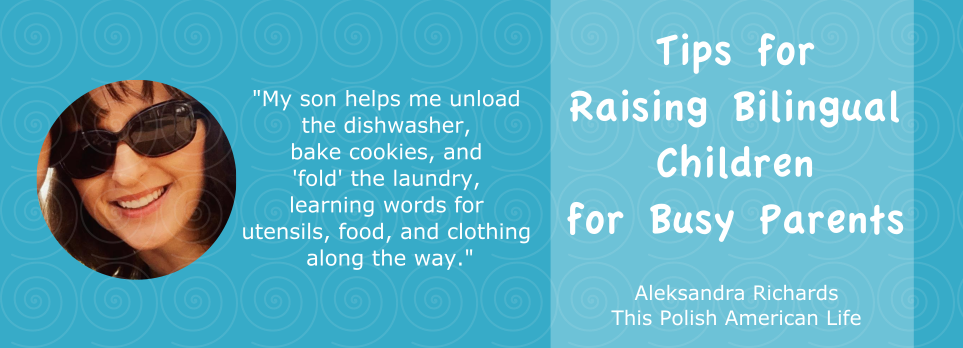
I am a mom who works full time, so time, especially with my son, is precious. Almost every minute spent away from my family and work is spent doing or thinking about things that are necessary for our household so that I can focus solely on quality time with my son when we get home. Yet even those hours don’t seem like enough, a sentiment I am sure I share with other working parents.
When I read on various outlets dedicated to bilingualism that a child must be exposed to the minority language for 30 percent of their waking time, I had a mini panic attack. My son is at an English-speaking day care while my husband and I are at work, and at home I am his sole Polish source on a daily basis. I put extreme pressure on myself to get as much language exposure in as I could through organized lessons. I panicked every time my toddler wouldn’t sit still for story time or to look at flash cards. The language exposure process felt more like boot camp than something natural and fun.
So I took many deep breaths and remembered who I was first and foremost—a mom, and what my main goal was—to have quality time with my child. I decided to take a more simple approach: live life but in Polish.
Here are my 4 strategies that helped increase my son’s exposure to Polish and saved my sanity.
- Narrate daily activities.
Whether we are at home, in the car, at the grocery store, or at the park, I point out objects and tell my son what they are and what we are doing. My son is at the stage where he wants to help with daily tasks and I try to include him in as many as possible. He helps me unload the dishwasher, bake cookies, and “fold” the laundry, learning words for utensils, food, and clothing along the way. I also bought him an Elmo bath toy that he bathes during his bath time. I usually specify what body part of his I will wash next and my son will do the same to Elmo. - Read.
My toddler is very energetic and can hardly sit still long enough to go through an entire book. I took that into consideration and now read to him while he is drinking his milk before bed. I purchased some bilingual books on Amazon that my husband usually reads to our son so that way my son is exposed to the same story just in a different language. - Take advantage of technology.
Polish language resources for kids are not easily accessible in the United States, so I rely on YouTube for children’s songs and cartoons. My husband and I try to limit our son’s exposure to technology, but we pick our battles. When dinner needs to be made in 30 minutes, we will let my son play a Polish language app or watch a children’s program in Polish. We heavily rely on technology for video chatting with my parents or family in Poland. This allows my son to not only connect with family on a regular basis but to hear non-accented Polish. - Set realistic expectations/let go of pressure.
I drove myself crazy trying to fit in as many “lessons” into our time spent together. The moment I relaxed and just went about life normally I noticed my son’s understanding and willingness to repeat words/sentences increased. It is also very important (and good for everyone’s well-being) to not get discouraged when your child says more words/sentences in English than in your native language. I constantly have to remind myself that, at this stage especially, my son’s use of English is not a bad thing. On the contrary, his English language development is a reflection of him learning and his over-all development. So what should a parent do? Continue talking in your target language. I’ll be the first to admit that the Polish language is difficult, especially to pronounce. My son is currently mixing languages in his sentences, so it doesn’t surprise me that he will say red światło instead of czerwone światło when we are waiting at the red traffic light. Do I get a little bummed if he points up to the sky and says moon instead of księżyc? Of course, but I remind myself that he is only two years old and is still trying to figure out talking and communicating in any way he can, let alone a specific language. When my son does say something in English, I respond in Polish along the lines of, “Very good, that is the księżyc. Daddy says moon and mama says księżyc.”
Aleksandra Richards is a wife to an American stud and a mom to a 2-year-old human child and a 6-year-old fur child. Originally from Poland, she lives in California, where she is doing her best to raise her son to be bilingual and connected to his Polish roots. Between changing diapers, keeping everyone alive, and working outside the home, Aleksandra keeps her sanity intact by relishing toddler hugs, devouring her husband’s awesome cooking, and saying lots of prayers—in English and Polish. You can follow her on thispolishamericanlife.wordpress.com, Facebook, and Twitter.




